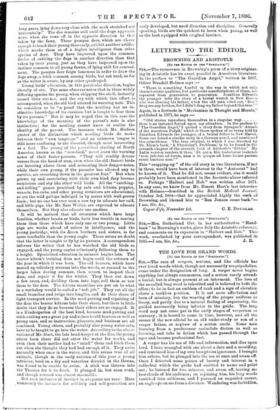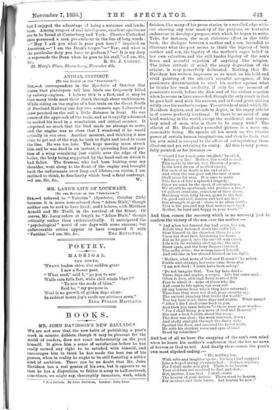THE LOVE FOR GRAND WORDS.
[To THE EDITOR OP THE " SPECTATOR:]
Sre,—The race of vergers, sextons, and like officials has ever loved words which, though not necessarily sesquipedalian, come under the designation of long. A verger never begins anything but always commences, and a sexton rarely attends a burial, but is always present at an interment. The love of the so-called long word is inherited and is believed to befit the office; to be in fact an emblem of rank and a sign of elevation above a rankless position. It is not mere affectation and born of mimicry, but the wearing of the proper uniform or livery, and partly due to a natural feeling of superiority, the guided necessarily being inferior to the guide. The long word may not come pat in the early stages of vergerism or sextonry ; it is bound to come in time, however, and all the sooner if the new official be an old under-study or son of a verger father, or nephew of a sexton uncle. Some men learning from a predecessor assimilate diction as well as learning, and take in fiction which has passed through the ages and become professional fact.
A verger has his sea of life and information, and dies upon land. I have wrangled with one about a date and a moulding, and convinced him of my own bumptious ignorance. I brought him ashore, but he plunged into the sea at once and swam off. Once I detected some points of beauty and interest in a cathedral which the guide had omitted to name and point out; he listened for two minutes, and swam off, leaving me two-thirds of his audience ; on rejoining him, his long words vanished into sulkiness, and I pursued an unguided career, an eagle-eye on me from a distance. Wandering was forbidden, but I enjoyed the advantage of being a nuisance and lands- man. Among vergers of real intelligence, excellent specimens are to be found at Canterbury and York. Chester Cathedral once possessed a man pre-eminent in the line of long words : —" May I ask you what is your post here P" inquired an American.—" I am the Dean's verger."—" Yes ; and what is the particular duty you have to perform P "—" It is my duty co supersede the Dean when he goes to his stall."—I am, Sir,



















































 Previous page
Previous page